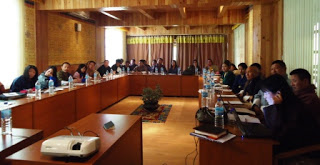
The National Biodiversity Center of Bhutan hosted a two-day multi-stakeholder capacity development workshop on Developing a National Access and Benefit Sharing (ABS) Policy for Bhutan. The workshop was facilitated by Kabir Bavikatte (Natural Justice) and Morten Tvedt (Fridtjof Nansen Institute). The workshop explored a number of issues arising from the Nagoya Protocol on ABS, including regulating access to genetic resources and traditional knowledge in Bhutan, ensuring compliance with Bhutanese ABS law, and the rights of Bhutanese communities.
The workshop had 32 participants representing Bhutan’s Ministry of Forests and Agriculture, civil society organizations, community groups, and research and private sectors. One of the most interesting aspects of the workshop was a collective visioning process of what a potential ABS policy for Bhutan could look like. The visioning process sought to use Bhutan’s Gross National Happiness indicators to analyze whether Bhutan needed ABS as an incentive for conservation considering that 70% of Bhutan’s lands are under forest cover. The participants decided that Bhutan required an ABS policy to secure benefits and livelihoods to be able to justify their strong conservation policies to a growing population. However, they wanted to take the time to develop an ABS policy with a difference – one that would generate livelihoods, develop Bhutan’s research capacity, collaborate with ethical companies, focus on products that are environmentally friendly, and stay true to their cultural and spiritual values.
The workshop will be followed by further planning meetings facilitated by Bhutan’s National Biodiversity Center. The meetings will be held with the aim of developing a road map for an ABS policy that is widely consulted in Bhutan and is rooted in the criteria of Gross National Happiness.
